Schole. Философское антиковедение и классическая традиция @classics-nsu-schole
Статьи журнала - Schole. Философское антиковедение и классическая традиция
Все статьи: 755
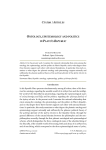
Ontology, epistemology and politics in Plato’s Republic
Статья научная
In the present work I examine the rational relationship that exists among the ontology, the epistemology, and the politics in Plato’s Republic, and to what degree these three theories support each other with rational foundations. In particular, this study examines to what degree the platonic ontology and epistemology support rationally and sufficiently the platonic political theory of the φιλόσοφοι-βασιλεῖς of the ἀρίστη πολιτεία in the Republic.
Бесплатно
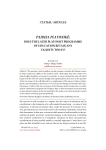
Статья научная
В данной статье я хотел бы рассмотреть вопрос о том, может ли тот способ обучения, который был характерен для античных платонических школ, представлять какой-либо интерес для современного образования? Мой вывод состоит в том, что, на самом деле, может, хотя и не повсеместно. В конечном итоге, образовательная программа, которая, после начального освоения правил рационального мышления и аргументации, сначала касается проблемы бытия как целого, а затем переход к таким более частным дисциплинам, как этика, политика, физика и метафизика, вполне подходит для воспитания широко образованного и рационально мыслящего человека. Мне кажется, что подлинным наследием платонической модели образования, от которой современная цивилизация постепенно отворачивается, является мысль о том, что подобающим образом структурированное изучение весьма абстрактных вещей - это лучшая тренировка для ума, даже если затем ему придется обратиться к решению полностью практических вопросов.
Бесплатно
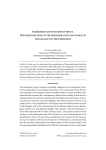
Статья научная
In this essay, the function of the personification of Parmenides himself with the horse of Ibycus in the dialogue of Plato’s Parmenides will be elaborated. The analytical process of this reference by Parmenides will focus to demonstrate that the personification is an allegorical element of Plato whose role in the dialogue is crucial for the understanding of the author's objective about the second more extended part of the Parmenides.
Бесплатно
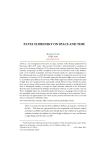
Pavel Florensky on space and time
Статья научная
An investigation of the views on space and time of the Russian polymath Pavel Florensky (1882-1937). After a brief account of his life, I study Florensky’s conception of time in The Meaning of Idealism (1914), where he first confronts Einstein’s theory of special relativity, comparing it to Plato’s metaphor of the Cave and Goethe’s myth of the Mothers. Later, in his Analysis of spatiality and time, Florensky speaks of a person’s biography as a four-dimensional unity, in which the temporal coordinate is examined in sections. In On the Imaginaries in Geometry (1922), Florensky argues that the speed of light is not, as in Relativity, an absolute speed limit in the universe. When bodies approach and then surpass the speed of light, they are transformed into unextended, eternal Platonic forms. Beyond this point, time runs in reverse, effects precede their causes, and efficient causality is transformed into final or teleological causality, a concept on which Florensky elaborates in his Iconostasis. Florensky thus transformed the findings of Einsteinian relativity in order to make room for Plato’s intelligible Ideas, the Aristotelian distinction between a changing realm of earth and the immutable realm of the heavens, and the notion of teleology or final causation. His notion that man can approximate God’s vision of past, present and future all at once, as if from above, is reminiscent of Boethius’ ideas.
Бесплатно
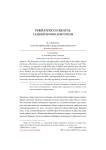
Peripateticus creatus: Галилей против Аристотеля
Статья научная
В историко-научной и философской литературе широко распространено мнение, что Г. Галилей опроверг теорию свободного падения, изложенную Аристотелем в трактатах «О небе» и «Физика». Однако сравнительное изучение текстов Галилея и Аристотеля показывает, что они рассматривали а) разные физические ситуации и б) по-разному понимали термин «тяжесть». Кроме того, Галилей фактически оспаривал не реальные взгляды и утверждения Аристотеля и его последователей, но их упрощенные трактовки, распространенные в Средние века и в XVI - начале XVII века, с которыми и полемизировал тосканский ученый.
Бесплатно
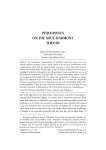
Philoponus on the soul-harmony theory
Статья научная
The Neoplatonic commentaries on Aristotle’s works have always been considered somehow suspicious. That is partly related to the doctrinal commitments of the commentators, partly with the hermeneutical strategies to which they seem to recur. Both of these reasons have also give place to the accusation of distortion and misunderstanding of Aristotle’s philosophy. In the following paper I want to perform an exercise of disclosing the hermeneutical procedure that one of this commentators applies to one of the passages of the first book of the De Anima. The commentator is Philoponus, the passage is the refutation of the soul-harmony theory. My aim is to show that, despite the doctrinal commitments that the commentator may have, his methodology follows Aristotelian guidelines. I hope that this could open perspectives on the value that the commentators must have as philosophers, rather than merely interpreters or paraphrasers
Бесплатно
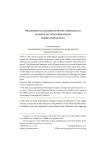
Philosophical background of the cosmological polemics in Contra Manichaeos by John of Damascus
Статья научная
This article analyzes the philosophical arguments used by John of Damascus against the Manichaean dualist cosmological system in his Dialogue contra Manichaeos, showing some parallels with his Dialectica, and revealing a common Aristotelian background. The philosophical argument in the Dialogue seems to be a practical application of philosophical doctrines formulated in the Dialectica. From a wider perspective of anti- Manichean polemics used in part for instructional purposes for students of philosophy and theology in Late Antiquity, the conclusion is made that the purpose of the Dialogue was aimed not so much against the Manichaean cosmogony and cosmology, but against the Manichaean theodicy which might have been attractive to some Christians of John’s times.
Бесплатно
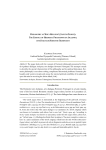
Статья научная
The paper deals with the concept of Hermetic philosophy presented in Pseudo-Apuleius' dialogue Asclepius, sive dialogus Hermetis Trismegisti . The attempt is made to describe the special characteristic of this philosophy and its spiritual dimension. Hermetic philosophy is not about solving complicated theoretical problems. Hermetic philosophy only wants to inspire and arouse the natural spiritual sensibility of its adept and open his mind to receiving the divine Mind (God).
Бесплатно
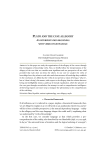
Plato and the cave allegory. An interpretation beginning with verbs of knowledge
Статья научная
In this paper we study the organization of the allegory of the cavern through the investigation of knowledge verbs. First, we briefly follow the interpretations of the allegory of the cave that we consider most significant and our perspective: all are valid provided that each does not deny the others. At our core we analyze the verbs of knowledge: how they relate to each other and what structure of knowledge they establish. In the conclusion, we affirm that the verbs do not present a vision of being as "what is", but as "what is being"; this means, with respect to the allegory, that the relation between being and intelligibility means a pathway of mutual equalization, which the prisoner of the cave goes through; nevertheless, the attempt to reach a comprehensive intelligence of the being requires one more step: to integrate the phenomena to the comprehension of the real thing.
Бесплатно
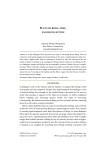
Plato on being, time, and recollection
Статья научная
In his dialogues Plato presents two ways of reasoning about Being. First, he constructs contrasting images that depict Being as if it were a spatiotemporal entity. Second, when a higher-order form of reasoning is needed, he uses the concept of the one and its relation to arithmos as an analogue for Being and its relation to not-Being. In Plato’s dialogues, images and arithmos are not mutually exclusive. Rather, they are complementary; Plato sometimes employs an image of a whole to portray that which is neither spatial nor temporal. Such an image is determined by a conceptual structure that joins many into one. Focusing on the Sophist and the Meno, I argue that the theory of recollection presents such an image.
Бесплатно

Статья научная
Does the philosopher Plato, despite his elevation to a supreme position in the intelligible world of the Beautiful itself, or the Idea of Beauty, really exhibit any appreciation of the beauties of nature, or Natural Beauty? The omission of any mention of the beauties of Nature in Diotima’s ladder of ascent to the Beautiful Itself in the Symposium leads me to propose that Plato, in line with the sensibility of Greeks of the Classical period in general, does not possess what would later be termed an ‘Arcadian’ view of the beauties of the natural world; and even in the later Platonist tradition there is little evidence of such sensibility.
Бесплатно
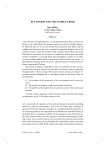
Platonism and the world crisis
Статья научная
In the article "Platonism and the World Crisis" John Dillon (Dublin) examines the most important problems of our time (such as environmental destruction, religious intolerance and the crisis of legitimization of public authority) in the context of Plato's philosophy and proposes to address once again the heritage of the great thinker of the past.
Бесплатно
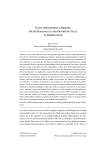
Plato’s Philosophical Mimesis: On the Pedagogical and Protreptic Value of Imperfection
Статья научная
This article addresses two often perplexing traits in Plato’s philosophical style: first, the fact that Plato’s writings are mimetic, despite the strong criticisms of mimesis we find therein; second, the fact that this mimesis not only features the constitutive defects inherent to any mimesis, but Plato actually increases its imperfection by adding other manifest defects. Based on epistemological and psychological views taken from the Platonic corpus (especially the soul’s tripartition), I show how Plato’s philosophical mimesis uses defectiveness or imperfection to overcome the limitations of mimesis identified in the Republic. To explain this, I argue that Plato’s philosophical mimesis should be primarily conceived as an imitation of people or conversations in which views or arguments are conveyed, but rather as an imitation of the act or practice of philosophical inquiry, and that by rendering this act visible to the reader, the Platonic corpus can better teach how to perform it and better turn readers to a life determined by its performance. This is not without risks because, as a type of mimesis, philosophical mimesis can still lead to misunderstandings or affect the soul in a negative way. However, the quantitative, qualitative and tonal defects Plato introduces in his mimesis of philosophical inquiry cause astonishment and therefore have a provocative effect that helps to reduce those risks and enhance the corpus’ pedagogic and protreptic potential. Consequently, Plato’s philosophical mimesis explores the benefits of mimesis and is in strong contrast with artistic or dramatic mimesis as is understood in Republic X.
Бесплатно
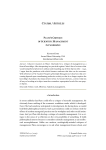
Plato’s critique of scientific management in Charmides
Статья научная
I discover resources in Plato’s Charmides for a critique of management as a form of knowledge. After interpreting in a practical register Critias’ idea of a science that would comprehend all sciences without understanding any of their objects (166c - 175a), I argue that the paradoxes with which Socrates confronts this idea can be overcome. With reference to F.W. Taylor’s Principles of Scientific Management , I show how this overcoming depends upon transforming productive activity so that it no longer requires the knowledge of products that characterizes techne . As Socrates foresaw, a science that has all ways of working as its object must have somehow expropriated work of its own proper objects.
Бесплатно
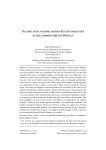
Playing and laughing gods of Plato's dialogues in the commentaries of Proclus
Статья научная
“Socrates’ irony” is a well-known topos even for those readers who are far from ancient philosophy. Dialogues of Plato contain different modes of humour, from mild self-irony to quite sarcastic tones. Plato’s gods are ‘playful,’ they treat people as those were ‘playthings.’ The best way of mortals’ life is to play also, spending their time in “sacrificing, singing, and dancing.” However, Neoplatonic commentaries to Plato tend to avoid explicit laughter and any direct mode of humour. Proclus Lycaeus, one of the most fruitful commentators of Plato, seems to disregard anything ludicrous in Plato’s writing. The places, where Plato speaks about laughter or playing games, are explained by Proclus as signs to some kind of divine activity towards the material realm. Even smile and laughter of particular humans are interpreted in the same way as symbols ( synthēmata ) of gods’ providence. What Proclus discusses in minor details, is the dialectics of gods’ procession into the sensible world, causing substantiation of the universe, and retention of the internal bonds that keep it eternal and unchangeable. Similarly, temporary particular beings also benefit from divine providence, which fortifies their vital capabilities. In general, these forms of providence are depicted by “the undying laughter” of gods. In spite of this approach seeming to be superfluously ‘scholastic’ and therefore losing the dramatic perspective of Plato’s writings, we suggest that Proclean interpretation may assume laughter to be related to some theurgic practice. Therefore, reading and interpretation the game- and laughter-related passages of Plato could have been considered themself a kind of theurgic “sacred play.”
Бесплатно
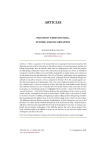
Plotinus views on soul, suicide, and incarnation
Статья научная
The questions that need to be answered, if we want to understand the role of suicide and its connection with the soul, incarnation, murder of man and living beings in the Universe of Plotinus, are as follows: To what extent should the body be considered an outer shell? Is purification the goal of the incarnation of the soul? Is it not the case that through the incarnation in the individual soul new, previously hidden possibilities are actualized, or is the body only a tool for punishing the soul and its alienation? Our ideas about Plotinus philosophy essentially depend on how we solve this riddle. And although, as the comparison of Ennead 1.4.46 and 1.9.16 shows, Plotin changed his attitude toward suicide as he age, this concept arises in his philosophy in several basic contexts. First of all, in the traditional sense for the present, he asks about whether the soul should, if it is given free choice, leave the body or stay in it? In addition, Plotinus enriches our concept of suicide with two additional meanings. Secondly, he considers self-incarnation to be suicide, illustrating this idea with the myths about the infant Dionysus and Narcisse: the incarnation is presented here as an involuntary suicide, the result of the irrational desire of the soul for matter. Secondly, suicide should be considered the killing or destruction of another living being or plant, because in this case we destroy a particle of a single soul, which are themselves involved. Unlike Plotinus, the late Neoplatonists, such as Damascus, insisted on the impossibility of a complete separation of the soul from the case as long as the body is alive, which made it impossible for the soul of the potential sage to completely immerse himself in the positive nothingness of the absolutely Ineffable first principle. After all, the soul is always connected with the body, which can not accompany its true self on the path to another in relation to the soul full of Nothingness.
Бесплатно

Статья научная
This article examines the parallels between the reforms of Gaius Gracchus and the actions of Spurius Cassius as described by Dionysius of Halicarnassus, shedding new light on the interpretation of grain dole, land allotments and the role of Italian allies in the Lex Agraria Sempronia. The narrative of Spurius Cassius appears heavily anachronistic, reflecting the conflicts of Gaius Gracchus’s era rather than those of the early Republic. Through a detailed analysis of the biographical structure of Plutarch’s parallel lives of Gaius Gracchus and Cleomenes, the article explores the moral and political frameworks imposed by these authors. These comparisons reveal indirect evidence suggesting that Gaius Gracchus may have included Italian allies in his land reforms, a hypothesis that contrasts with traditional interpretations of his legislation. By comparing literary and rhetorical strategies, the study highlights how Dionysius and Plutarch utilized historical figures to reflect broader political and moral debates. Upon examining these texts, the study contributes to a re-evaluation of Gracchus’s agrarian reforms and their implications for Roman-Italian relations during the late Republic.
Бесплатно
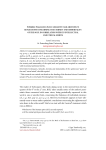
Статья научная
Comparing Ecclesiastes’ thoughts attested in Eccl. 3:10-11, 21; 7:29, 8:5-7, 11-14, 11:5, 9, 12:3-7, 14 with Aristotle’s ideas recorded in his treatises On the Soul (II, 2, 413a3-10, 413b24-25; III, 5, 430а22-25; V, 4, 430а1-4), Metaphysics (XII, 1070а26, 1074b1-14), and Nicomachean Ethics (I, 11, 1100a29-30, 1101a35-1101b9; X, 7, 1177a11-1178a8, cf. also Protrepticus, fr. 10c), the author tries to reveal possible parallels in these thinkers’ views on the eternity and immortality of the spirit/soul and posthumous requital in correlation with its rational and moral merits.
Бесплатно
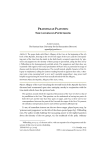
Praestigiae platonis: the cavernous puppetshow
Статья научная
The paper deals with Plato’s Allegory of the Cave at the beginning of the 7th book of the Republic , focusing on the two lowest stages of the Cave (and the corresponding parts of the Line from the simile in the Sixth book), occupied, respectively, by ‘prisoners and puppeteers’; the identity of these groups is questioned, along the lines set by J. Wilberding in his homonymously entitled article. The puppeteers and their show are examined with regard to the lexical peculiarities of Plato’s text, in particular his usage of thauma and the derived thaumatopoios . The overall ironical, playful character of the Allegory is emphasized, calling for cautious reading beyond its apparent face value. A Russian term vertep , meaning both ‘a cave’ and ‘a portable puppetshow’, may prove itself helpful in approaching the sense Plato actually intended with his Allegory.
Бесплатно
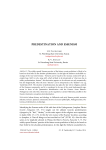
Статья научная
The widely spread Essenes practice of the future events prediction is likely to be based on their belief in the absolute predestination. In this light the hitherto unclarified etymology of the very term Ἐσσαῖοι / Ἐσσηνοί can be traced to the Aramaic notion חשיא (pl. st. emph.)/resp. חשאין (st. abs.; sing. חשא), which is likely to be interpreted as “what man has to suffer, predestination, fortune”; this derivation appears to be relevant not only semantically, but also linguistically. Thus the term “Essenes” can be interpreted as the “fatalists” (see e.g. Tantlevskij 2013). The doctrine of predestination also plays the key role in religious outlook of the Qumran community, and it is considered to be one of the most fundamental arguments in favor of the Qumranites identification with the Essenes. Some Platonic-Pythagorean (not only Stoic) doctrines can be regarded as certain Hellenistic parallels to the Essenic-Qumranic conception of predestination.
Бесплатно

